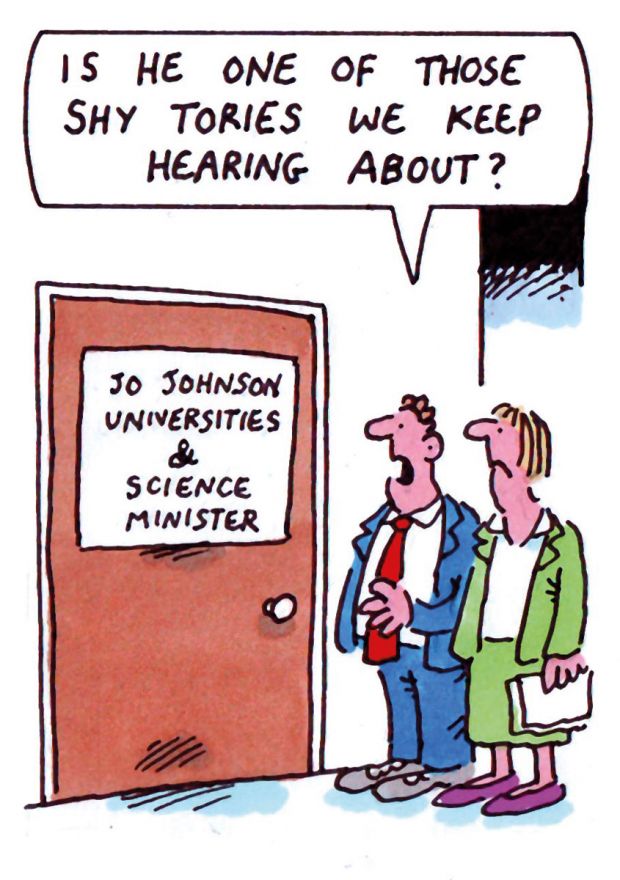
- Jo Johnson, the new universities and science minister, is yet to set out his stall in the media since being appointed on 11 May. A spokesman at the Department for Business, Innovation and Skills dead-batted an interview request from Times Higher Education by saying that the minister is seeking to “get his feet under the desk”. A profile of Mr Johnson on the ConservativeHome website says: “Except to the local press in his constituency of Orpington, in south-east London, he has never given an interview.” Speaking on a radio phone-in last week, Mr Johnson’s father, Stanley, expressed surprise on hearing of the appointment. “Good heavens. I don’t think he knows anything about science,” was his reply. Maybe public pronouncements will follow after a sensible effort to command the brief.
- “Pursue Impossible”: this slogan is the result of the University of Western Australia’s recently unveiled “bold new brand”, intended to “reflect its place as a contemporary place of teaching, learning and research, and a global hub of excellence”. Gordon Royle, a professor of mathematics at UWA, related his nine-year-old daughter’s reaction to the new slogan in a 13 May blog post: “It doesn’t make any sense – and it’s not even proper English!” Professor Royle added: “So what do we all think of our new motto? Everyone that I’ve spoken to has reacted with…disbelief, bewilderment or derision, but I’m not sure which is winning at the moment.” But perhaps Professor Royle and his daughter need to see it from a branding consultancy’s perspective. Find hackneyed motivational mantra. Drop definite article to make it sound fresh. Cash cheque.
- US higher education is often said to resemble an “arms race” where colleges spend big on sports and leisure facilities to attract students. Splashing the cash on “lengthy and at times bizarre” speeches from Hollywood stars appears to be another side-effect. In a graduation ceremony speech at the University of Houston that had already courted controversy for its cost, Matthew McConaughey “referenced playing bongos in his ‘birthday suit’ to tell the crowd that ‘an honest man’s pillow is his peace of mind’ ”, the Houston Chronicle reported on 15 May. He also talked about “a walkabout in Peru during which he stripped naked, vomited up all the bile in his belly and awoke the next morning feeling light and free”. The Interstellar star probably did feel light and free after being flown in on a private jet and staying in a VIP hotel suite paid for by Houston. McConaughey will donate his reported $135,000 (£87,296) fee to charity.
- “Demonstrators occupying a University of Manchester building have accused institution chiefs of ‘siege tactics’,” the Manchester Evening News reported on 17 May. The Free Education MCR group began their “anti-government demonstration” by occupying part of the business school and holding workshops on William Blake and on transgender issues. One demonstrator said: “They have security guards on every single exit and they’re not letting anyone else in…The university are employing siege tactics.” Sieges normally work by trying to keep people in. But the protesters managed to bypass the inverse-siege and “smuggle a further 30 undergraduates into their camp”. A university spokesman said: “A number of students are occupying a room in the Harold Hankins Building and are free to leave any time they wish.”
- A university lecturer in Israel “gained internet fame” after a photo of him holding a student’s grumpy baby, while continuing to teach, went viral. Sydney Engelberg’s moment of fame came after “a former student went onto an Israeli social media site and shared a photo of the professor in front of a white board mid-lecture, holding a baby in star-covered footie pajamas”, the CNN website reported on 18 May. The lecturer, who teaches postgraduate courses in organisational behaviour at Hebrew University and Ono Academic College, said that such moments were common. He said that it was important to put into practice good management principles and relate “to those students who are unable to find alternative childcare arrangements in a way which enables them to remain engaged, which shows respect for their situation”.
Register to continue
Why register?
- Registration is free and only takes a moment
- Once registered, you can read 3 articles a month
- Sign up for our newsletter
Subscribe
Or subscribe for unlimited access to:
- Unlimited access to news, views, insights & reviews
- Digital editions
- Digital access to THE’s university and college rankings analysis
Already registered or a current subscriber? Login
